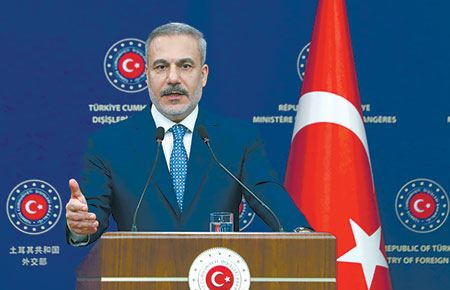
Turkey has voiced strong indignation and concern over its continued exclusion from the European Union’s Security Action for Europe (SAFE) program, a pivotal credit initiative designed to bolster the continent’s defense industry. Ankara squarely attributes this blockade to the concerted efforts of Greece and Cyprus, with Turkish Foreign Minister Hakan Fidan publicly asserting that Athens’ actions are actively undermining European security and exacerbating regional instability.
The core of the dispute with Greece originates from a long-standing point of contention: a 1995 “casus belli,” or formal declaration of war, threat issued by Ankara concerning maritime boundaries in the Aegean Sea. Minister Fidan critically highlighted this, recounting how the Greek Prime Minister allegedly boasted in parliament about successfully thwarting Turkey’s inclusion in SAFE. Lana Zochiou, spokesperson for the Greek Foreign Ministry, has consistently reiterated that the revocation of this *casus belli* remains a non-negotiable precondition for any progress, even as both nations continue to engage in political dialogue.
Adding another layer of complexity, Cyprus has unequivocally aligned with Greece in opposing Turkey’s participation in SAFE. Cypriot President Nikos Christodoulides emphasized that Nicosia’s objections stem from the unresolved “island issue”—the protracted division of Cyprus. Christodoulides underlined that Turkey’s entry into the program is contingent upon its demonstration of “concrete positive changes” regarding the Cyprus problem, a responsibility he firmly places on Ankara. He further underscored the shared EU position, articulated during discussions with NATO Secretary-General Mark Rutte, that member states infringing upon the sovereignty and territorial integrity of others cannot expect to benefit from such strategic instruments.
These geopolitical tensions are unfolding against a backdrop of intensified regional friction, particularly exacerbated by the recent conflict in Gaza and the subsequent 12-day escalation between Israel and Iran. Turkey alleges that both Greece and Cyprus provided crucial logistical and transit support to Israel during these periods, including the temporary relocation of Israeli civilian aviation to Cypriot territory for safety. Foreign Minister Fidan made startling claims, stating that “planes taking off from Cyprus caused the death of many Palestinians,” directly implicating Nicosia in the regional offensive.
Fidan did not shy away from further lambasting Nicosia for its burgeoning defense procurements from Israeli manufacturers, condemning what he termed “excessive armament” and a “militaristic approach.” He issued a stark warning that this trajectory risks leading Cyprus “in the wrong direction,” questioning the prudence and strategic foresight of its leadership. This severe criticism follows reports of Cyprus significantly enhancing its air defense capabilities with Israeli-made Barak MX missile systems, with an anticipated increase in acquisitions after recent regional escalations. Ankara views this military buildup as a direct threat to the “fragile balance” in the Mediterranean, cautioning Nicosia against confrontational scenarios given what it describes as the island nation’s lack of substantial “military experience.”
Ankara explicitly perceives the strengthening trilateral alliance between Greece, Cyprus, and Israel as a multi-pronged strategic front directed against its regional interests. In a recent interview with state broadcaster TRT, Fidan spoke ominously of “visible and invisible zones surrounding Turkey,” identifying these “alliance networks formed against Turkey” as a key component of the former. He issued a thinly veiled threat, stating that while diplomatic measures are currently being pursued, if these issues remain unresolved, they would be escalated to military and security structures for “further action,” hinting at potentially severe repercussions.
This escalating friction in the Eastern Mediterranean presents a significant challenge to broader Western military cooperation and risks undermining the cohesion of both the European Union and NATO. The European Commission has acknowledged Turkey’s request to join SAFE but has affirmed its commitment to meticulously considering the “concerns of other EU member states.” This delicate balancing act underscores the deep internal divisions within these crucial alliances, where intra-member disputes threaten to destabilize collective security efforts and regional stability at a critical geopolitical juncture.
